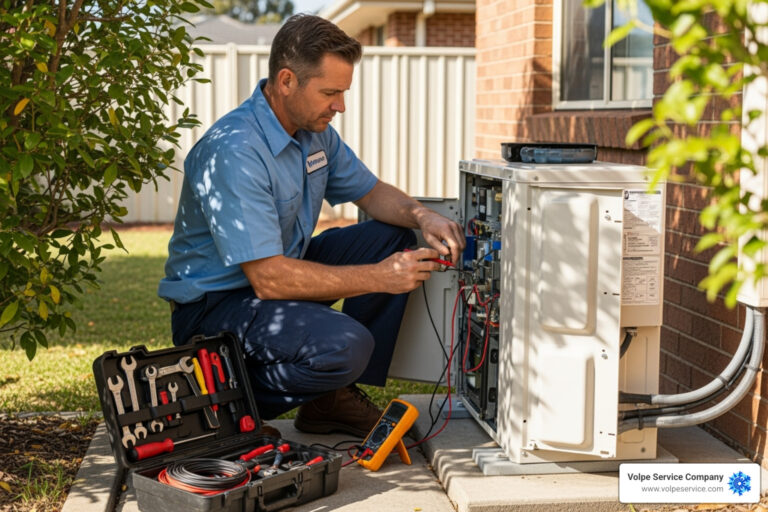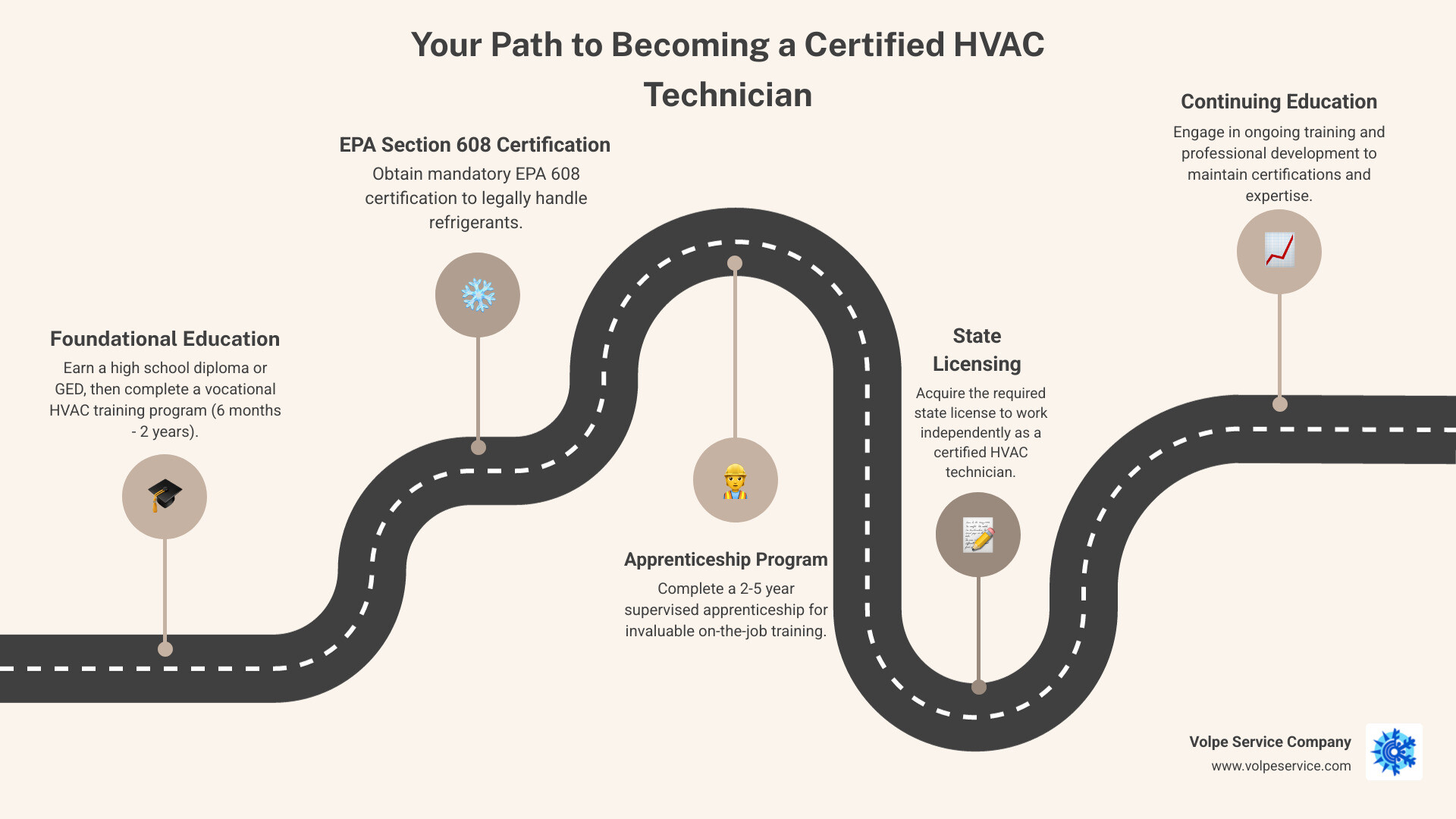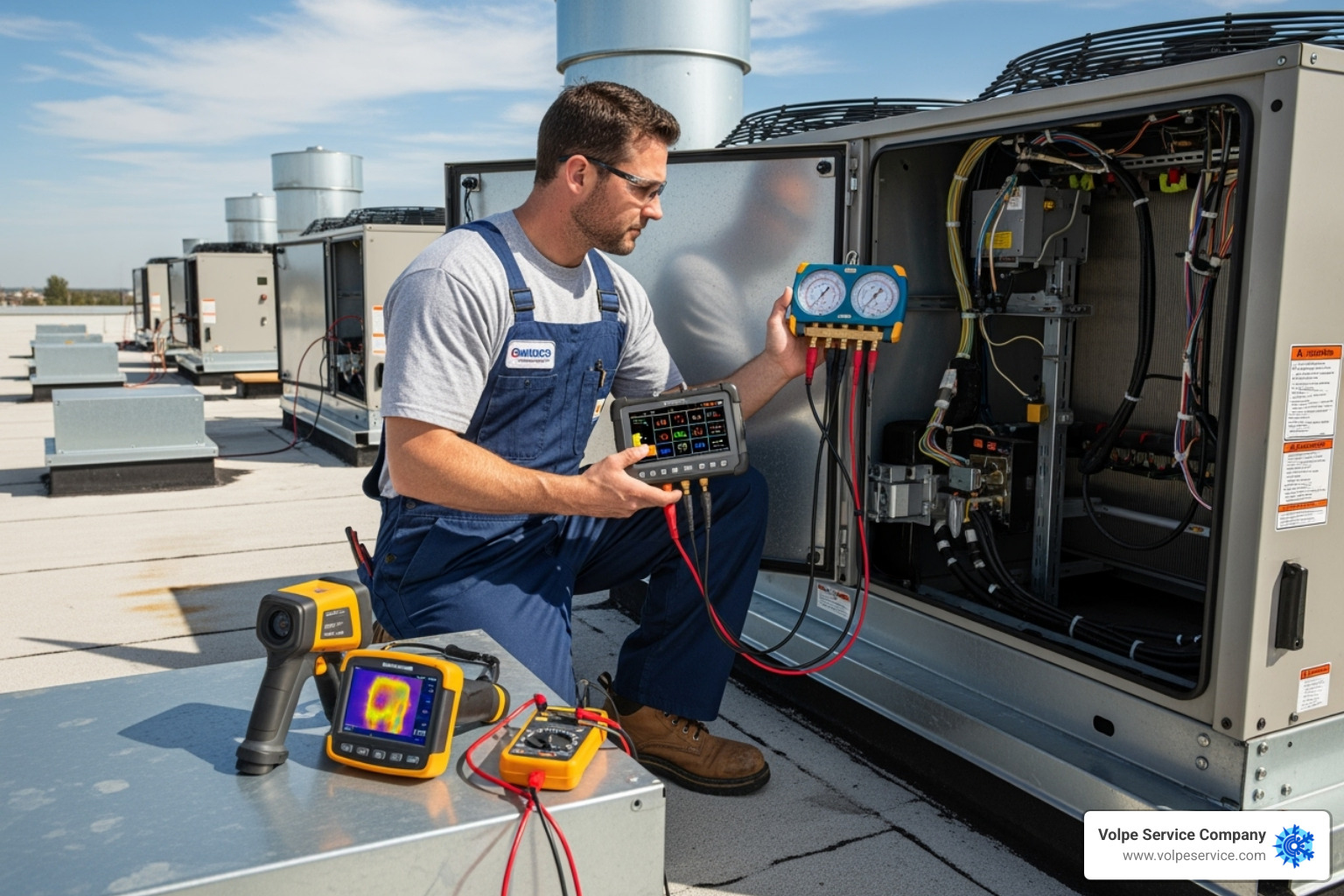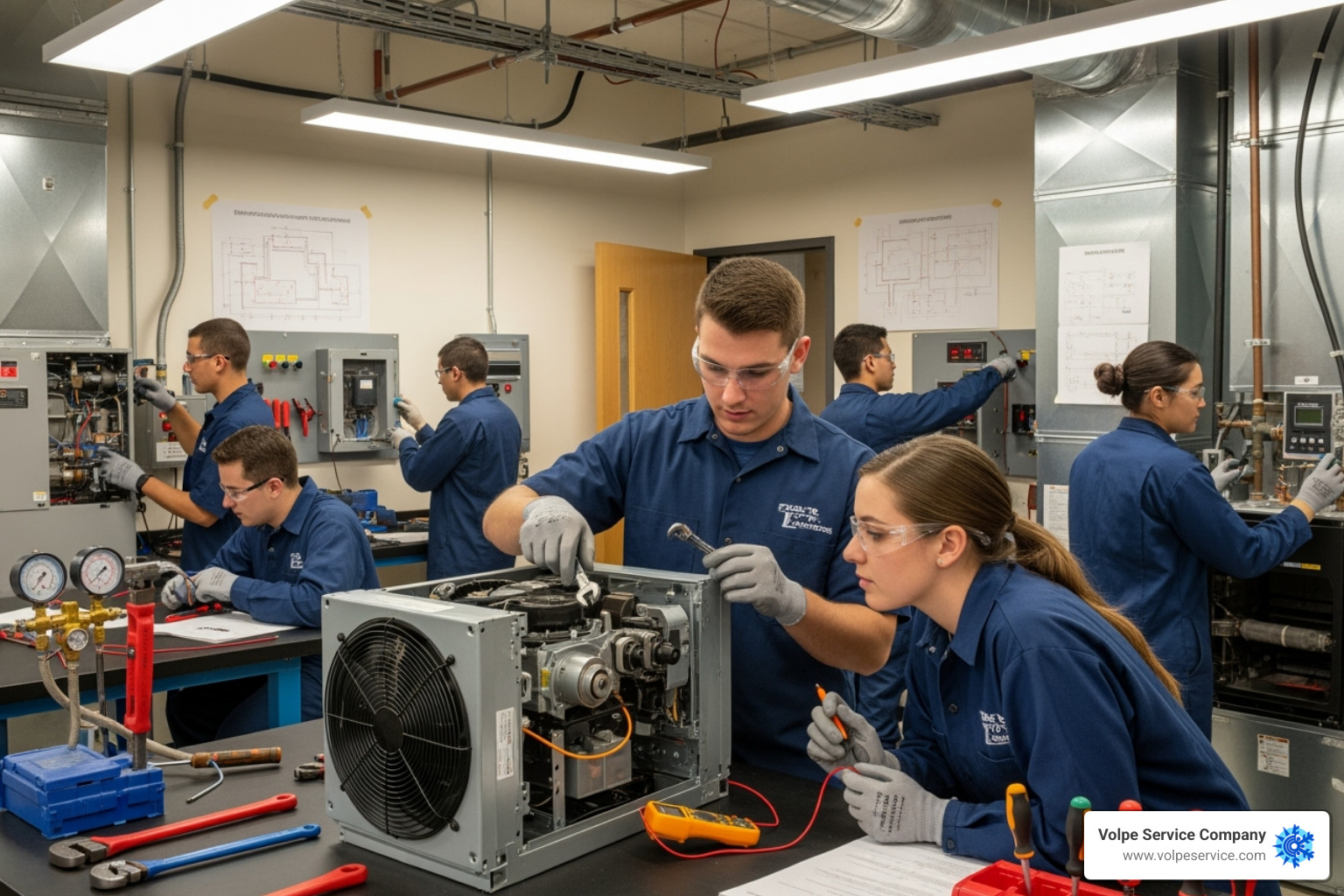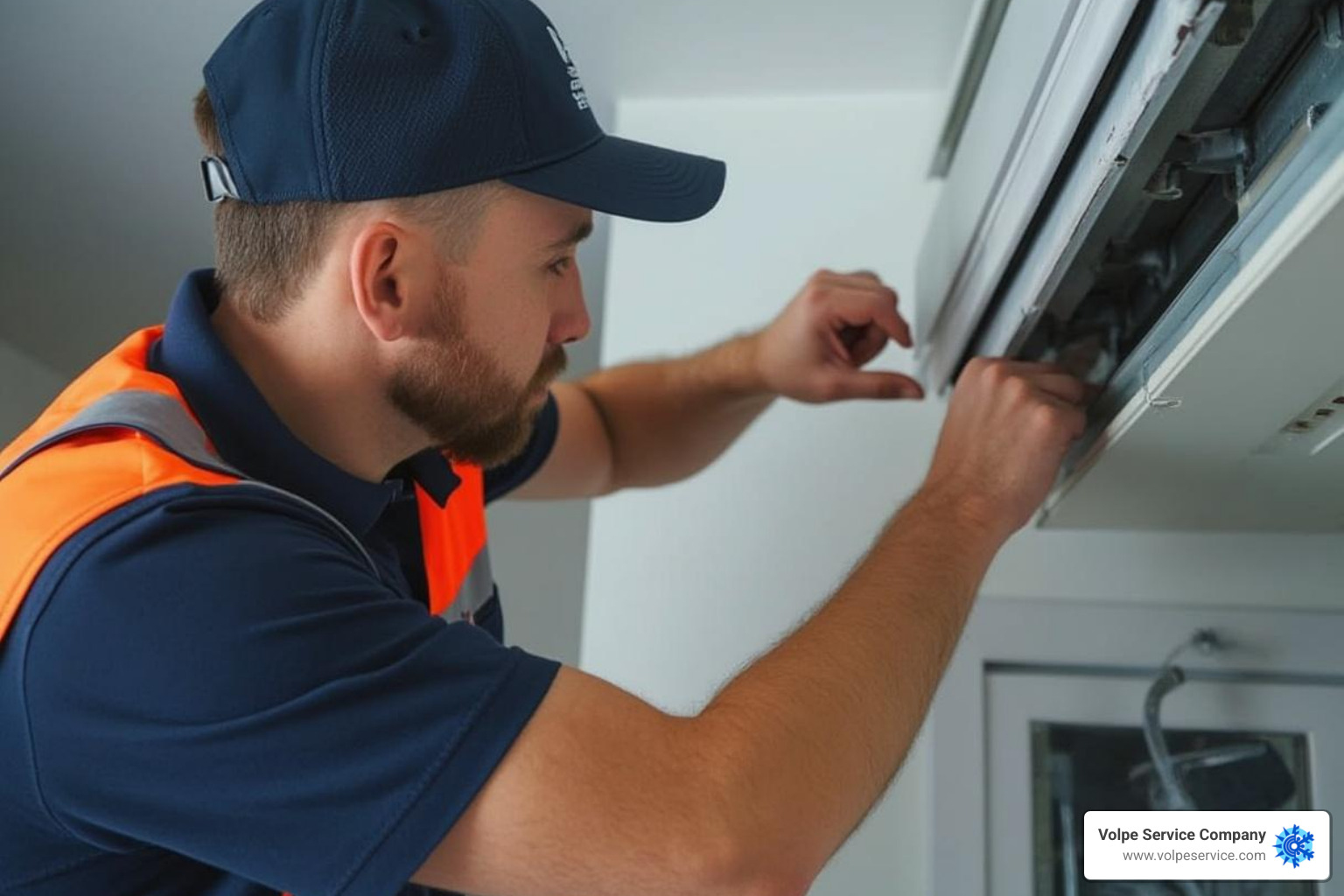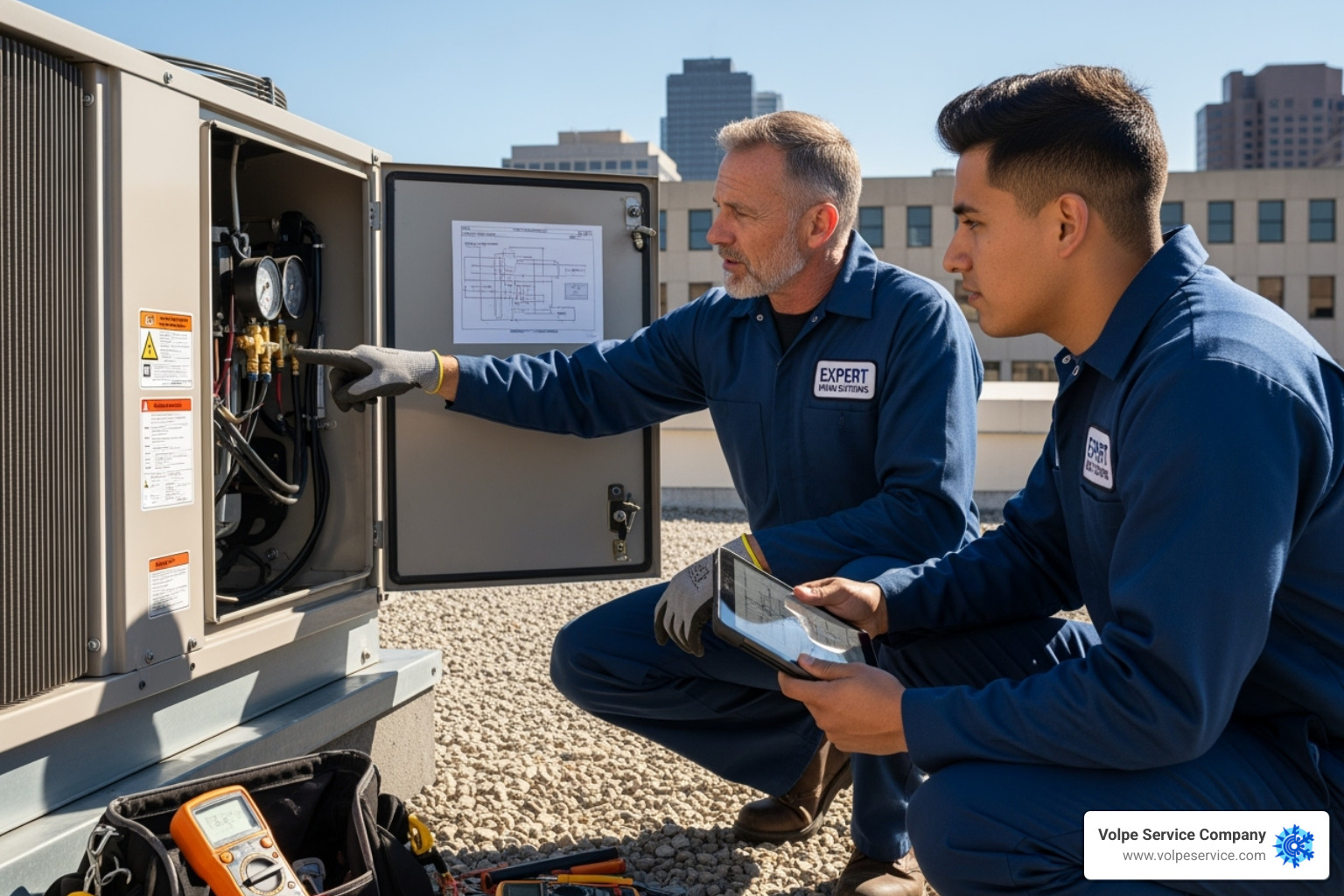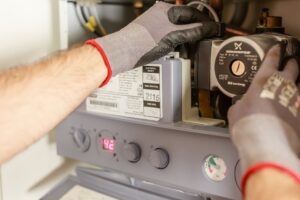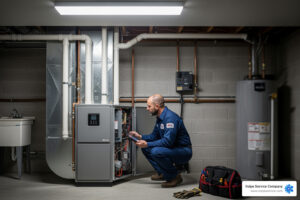Why Certified HVAC Technicians Are Essential for Your Home and Business
Certified HVAC technicians are skilled professionals who have completed specialized training and earned industry-recognized credentials to install, maintain, and repair heating, ventilation, and air conditioning systems. Here’s what makes them different from uncertified workers:
- Education: High school diploma or GED plus vocational training (6 months to 2 years)
- EPA Certification: Mandatory Section 608 certification to handle refrigerants
- State License: Required to work independently (age 18+ in most states, 21+ for contractors)
- Apprenticeship: 2-5 years of supervised on-the-job training
- Continuing Education: Ongoing training to maintain certifications
The HVAC industry is booming. With average salaries ranging from $47,000 to over $100,000 annually, and steady job growth expected through 2032, becoming a certified HVAC technician offers both financial stability and career satisfaction.
But certification isn’t just about earning potential – it’s about trust. When you hire certified professionals, you’re getting technicians who understand complex electrical systems, can safely handle refrigerants, and follow strict safety protocols to protect your home and family.
As one industry expert notes: “HVAC certification demonstrates that you have the necessary knowledge and skills to perform HVAC duties professionally, properly, and safely.”
Whether you’re a homeowner seeking reliable service or someone considering this rewarding career path, understanding HVAC certifications helps you make informed decisions about your comfort and future.
What Does a Certified HVAC Technician Do?
Think of certified HVAC technicians as the guardians of your comfort. We’re the professionals who make sure your home stays cozy in winter and cool in summer, working behind the scenes to keep your heating, ventilation, and air conditioning systems running smoothly.
Installation is where many projects begin. Whether it’s a brand-new furnace in a family home or a complex commercial system in an office building, we handle the entire process from start to finish. This means carefully connecting ductwork, wiring electrical components, and ensuring every pipe fits perfectly. No detail is too small when it comes to your comfort.
Maintenance keeps systems running at their best. Regular tune-ups might seem routine, but they’re actually quite involved. We clean coils, check refrigerant levels, calibrate thermostats, and inspect dozens of components. This preventive care helps avoid those midnight breakdowns when you need your system most.
When something goes wrong, repair work showcases our problem-solving skills. A system that won’t start could have an electrical issue, a refrigerant leak, or a dozen other problems. We use diagnostic tools and years of experience to find the root cause and fix it right the first time.
Certified HVAC technicians work on both residential systems like your home’s central air and heating, and commercial systems that climate-control entire buildings. Each type has its own challenges and requirements, but the goal remains the same: keeping people comfortable.
Beyond the technical work, we’re also your customer service representatives. We explain what’s wrong in plain English, not technical jargon. We respect your home, clean up after ourselves, and make sure you understand how to get the most from your system. After all, fixing equipment is only part of the job – building trust with homeowners is equally important.
To learn more about the full scope of our work, check out what an HVAC contractor does.
Key Skills and Knowledge Areas
The work of certified HVAC technicians requires mastering several technical areas that might surprise you. Electrical circuits form the backbone of modern systems – we read complex wiring diagrams and safely work with high-voltage components that power everything from simple thermostats to sophisticated building automation systems.
Refrigeration principles govern how air conditioners and heat pumps work. Understanding refrigerants, their properties, and the cooling cycle helps us diagnose problems and perform repairs safely. Airflow dynamics might sound fancy, but it’s really about making sure air moves properly through your home, providing even temperatures and good air quality.
Blueprint reading comes in handy during installations, especially in new construction. We interpret detailed drawings to place equipment exactly where it belongs. Safety protocols aren’t just suggestions – they’re life-saving practices that protect both technicians and homeowners from electrical hazards, refrigerant exposure, and other dangers.
Soldering and piping skills ensure leak-free connections that last for decades. Whether working with copper, steel, or modern materials, precise joints are essential. Finally, system diagnostics using specialized tools helps us quickly identify problems in today’s computerized systems, saving time and money for everyone involved.
These skills work together to create professionals who can handle any heating or cooling challenge that comes their way.
The Educational Pathway: From Classroom to Career
Starting on a career as a certified HVAC technician is an exciting journey that typically begins in the classroom. While a high school diploma or GED is the foundational requirement, specialized training programs are where aspiring technicians gain the essential knowledge and hands-on skills needed for the trade.
Most aspiring technicians enroll in vocational schools, community colleges, or dedicated trade schools. These programs vary in length, with some pre-apprenticeship programs designed to prepare students in as little as 12 weeks, while others, like diploma programs for combined HVAC and Gas Technicians, can take around 52 weeks. Longer course-based training segments can involve up to 1200 hours of in-class instruction.
The core curriculum of these programs is designed to provide a broad set of skills across heating, refrigeration, and air conditioning studies. Common topics covered include:
- Principles of electricity and electrical fundamentals
- Refrigeration theory and applications
- Forced warm air heating systems
- Hydronic heating systems (boilers and hot water systems)
- Air handling and distribution
- Gas Code study and venting practices
- Blueprint reading and system design
- Workplace safety and industry standards
- Customer relations skills
- Energy conservation measures and building science principles
- Installation, service, and repair of various HVAC/R systems
While traditional in-person learning with lab work is highly recommended for practical skills, some foundational theory can be accessed through online HVAC certification programs, offering flexibility for students. However, the hands-on nature of HVAC work means that practical training in a lab setting is indispensable.
Preparing for an Apprenticeship
The classroom portion is just the beginning. A significant part of becoming a certified HVAC technician involves securing and excelling in an apprenticeship. Educational programs play a crucial role in preparing students for this next step.
Through hands-on lab work, students gain practical experience with tools and equipment, bridging the gap between theory and real-world application. Foundational theory taught in classrooms provides the technical understanding necessary to grasp the complexities of HVAC systems. Moreover, safety training, including certifications like WHMIS (Workplace Hazardous Materials Information System), Working at Heights, Elevating Work Platforms, and Confined Spaces Hazard Awareness, is often integrated into programs, making graduates job-ready and safer.
Many programs also assist students with resume building and interview preparation, connecting them with potential employers. Pre-apprenticeship programs, in particular, are specifically designed to make individuals more attractive to potential employers by providing essential theory and hands-on skills quickly, giving them a significant advantage in securing an apprenticeship. This comprehensive preparation ensures that when students step into an apprenticeship, they are well-equipped to contribute and learn effectively.
Gaining Essential Certifications and Your New Jersey License
Navigating HVAC credentials can sometimes feel like solving a complex puzzle. For aspiring certified HVAC technicians, it’s crucial to understand the distinction between certifications and licenses, and how both contribute to a successful career, especially here in New Jersey.
Certifications are typically voluntary, industry-recognized credentials that demonstrate a technician’s specialized knowledge and skills in specific areas of HVAC. They are often awarded by independent organizations. Licenses, on the other hand, are mandatory, government-issued permits that legally authorize a technician to perform HVAC work within a specific jurisdiction, such as a state or municipality. While certifications showcase expertise, licenses grant the legal right to operate. Both are vital for a reputable and successful career.
Mandatory EPA Certification
One of the most critical and legally required certifications for any certified HVAC technician in the United States is the EPA Section 608 Certification. This certification is mandated by the Clean Air Act and is essential for anyone who works with refrigerants.
The EPA 608 certification ensures that technicians understand how to properly handle, recover, recycle, and dispose of refrigerants, preventing their release into the atmosphere where they can harm the ozone layer and contribute to global warming. It demonstrates expertise in building, repairing, and assessing small and low- or high-pressure appliances that contain these substances.
There are different types of EPA 608 certifications:
- Type I: For servicing small appliances (e.g., household refrigerators, window air conditioners).
- Type II: For servicing or disposing of high-pressure appliances (e.g., residential air conditioners, heat pumps).
- Type III: For servicing or disposing of low-pressure appliances (e.g., large commercial chillers).
- Universal: Combines all three types, allowing a technician to work on any type of refrigerant-containing appliance.
To obtain this certification, technicians must pass an exam that tests their knowledge of refrigerant management. We ensure all our technicians are fully compliant with EPA regulations, prioritizing environmental responsibility alongside expert service. You can learn more about the EPA Section 608 Certification process directly from the EPA.
Industry-Recognized Credentials for Certified HVAC Technicians
Beyond the mandatory EPA certification, several industry-recognized credentials can significantly boost a technician’s career prospects and earning potential. These certifications signal a higher level of expertise and commitment to the profession.
- North American Technician Excellence (NATE): NATE is the largest independent, third-party non-profit certification organization for HVACR professionals in the United States. NATE-certified technicians have proven their knowledge by passing specialized certification tests that represent real-world working knowledge of HVAC and HVACR systems. There are over 30,000 NATE-certified technicians nationwide. Choosing NATE-certified professionals means higher product performance, reduced energy bills, increased home comfort, and peace of mind for homeowners. NATE offers certifications in various specialty areas, including air conditioning, heat pumps, gas furnaces, and commercial refrigeration. For more details on NATE, you can visit their information page.
- HVAC Excellence: This organization offers a wide range of certifications, covering various aspects of HVAC/R. HVAC Excellence certifications focus on technical competency through education, and they offer up to 70 certification levels. Their core and professional exams typically require two years of experience.
The benefits of pursuing these voluntary certifications are substantial. Certified HVAC technicians with these credentials often command higher pay. Studies indicate that certified HVAC/R technicians can earn significantly more over their careers than non-certified colleagues. They also enjoy a better reputation among customers, equipment manufacturers, and utility companies, and are rated higher for safety, reliability, and technical knowledge. National certification also provides greater job mobility, allowing technicians to seek opportunities in different regions.
Becoming a Licensed HVACR Contractor in New Jersey
While certifications demonstrate skill, obtaining a state license is what legally authorizes an HVAC professional to operate independently. For us at Volpe Service Company, operating in New Jersey, understanding the specific licensing requirements is paramount.
In New Jersey, HVACR (Heating, Ventilation, Air Conditioning, and Refrigeration) contractors must be licensed by the State Board of Examiners of HVACR Contractors. This ensures that professionals meet stringent standards for competence and safety. The eligibility requirements for the Master HVACR licensing examination are quite specific:
- Age Requirements: Applicants must be at least 21 years of age.
- Educational Prerequisites: Official transcripts from accredited colleges, universities, vocational schools, or trade schools are required. This education must demonstrate proper refrigerant management, including high global warming potential gases.
- Apprenticeship Completion: Proof of completion of a U.S. Department of Labor-approved HVACR apprenticeship or training program is mandatory.
- Experience Requirements: Applicants must provide evidence of practical experience in the HVACR trade. This typically includes W-2 forms indicating work in the HVACR field and work certifications signed by a licensed HVACR contractor.
- Passing the State Exam: The final step is to pass the Master HVACR licensing examination administered by the Board.
These rigorous requirements ensure that only highly qualified individuals can become licensed HVACR contractors in New Jersey. For a detailed checklist and application forms, you can refer to the NJ HVACR license application page. Our commitment to data-driven solutions and guaranteed service is built upon having licensed, expert technicians who meet and exceed these state-mandated standards.
The Role of Apprenticeships for Certified HVAC Technicians
Think of an apprenticeship as the ultimate “learn while you earn” opportunity. While classroom education gives you the foundation, it’s during your apprenticeship that you truly become a certified HVAC technician. This is where theory meets reality, and where you’ll develop the confidence and expertise that only comes from working alongside seasoned professionals.
The beauty of HVAC apprenticeships lies in their paid, on-the-job training structure. Unlike many other career paths that require years of unpaid internships or entry-level positions with minimal pay, apprentices earn a real salary from day one. You’re not just observing – you’re contributing to actual projects while building your skills.
Most HVAC apprenticeships run between 3 to 5 years, giving you plenty of time to master the craft. During this period, you’ll work directly with experienced certified HVAC technicians who become your mentors and guides. These veterans of the trade share their hard-earned knowledge, from the best techniques for soldering copper pipes to troubleshooting tricky electrical issues that textbooks never quite prepare you for.
Your days won’t be spent just in the field, though. Apprenticeships combine hands-on work with classroom hours that deepen your understanding of complex systems and industry standards. You might spend your morning installing a new furnace and your afternoon learning about advanced refrigeration cycles. This blend ensures you’re not just learning to follow instructions, but truly understanding the “why” behind every procedure.
The mentorship aspect is perhaps the most valuable part of any apprenticeship. There’s something special about learning from someone who’s been in your shoes and worked their way up through the ranks. These experienced technicians don’t just teach you the technical skills – they show you how to communicate with customers, handle unexpected challenges, and maintain the highest safety standards on every job.
At Volpe Service Company, we’ve seen the value of professional training in developing technicians who are not just skilled, but truly professional and trustworthy. Our commitment to data-driven solutions and guaranteed service starts with investing in properly trained professionals.
When you complete your apprenticeship, you’ll have logged thousands of hours of real-world experience and earned your Certificate of Apprenticeship. This credential, combined with your certifications and state license, opens doors to a rewarding career with excellent job security and growth potential.
For those interested in exploring apprenticeship opportunities, the U.S. Department of Labor apprenticeship programs provide comprehensive information about available programs and how to get started. Every expert certified HVAC technician started exactly where you are now – and with dedication and the right training, you’ll be amazed at what you can accomplish.
Career Outlook: Salary, Growth, and Benefits
If you’re considering a career as a certified HVAC technician, you’re looking at one of the most stable and rewarding paths in the skilled trades. The numbers don’t lie – this field offers exceptional job security, impressive earning potential, and genuine career satisfaction.
The demand for skilled HVAC professionals continues to surge nationwide. With older systems needing replacement, new construction projects requiring climate control, and evolving energy efficiency standards, certified HVAC technicians are more valuable than ever. This isn’t just a temporary trend – it’s a long-term reality driven by our fundamental need for comfortable, safe indoor environments.
When it comes to earning potential, the HVAC field offers some of the most attractive compensation in the trades. Entry-level technicians typically start around $47,000 annually, but that’s just the beginning. With experience and additional certifications, many professionals earn $70,000 to $100,000 or more each year. The key factor? Certification makes a real difference in your paycheck. Studies consistently show that certified HVAC technicians earn tens of thousands of dollars more over their careers compared to their non-certified counterparts.
Career growth opportunities are virtually limitless. Once you’ve established yourself as a journeyperson, you can specialize in high-demand areas like commercial refrigeration, energy management systems, or smart home technology. Many technicians advance into supervisory roles, become trainers for the next generation, or transition into sales and project management positions.
Perhaps the most exciting path is entrepreneurship. Experienced certified HVAC technicians often launch their own businesses, becoming independent contractors who set their own schedules and build their own client base. The combination of technical expertise and business acumen can be incredibly lucrative.
Beyond the financial rewards, this career offers something many desk jobs can’t – genuine job satisfaction. There’s something deeply rewarding about diagnosing a complex system problem, executing a perfect repair, and seeing a customer’s relief when their comfort is restored. Every day brings new challenges, different locations, and the satisfaction of hands-on problem-solving.
The field also provides excellent work-life balance opportunities. While emergency calls are part of the territory, many HVAC professionals enjoy regular hours, seasonal variety, and the flexibility that comes with being in high demand. Plus, as technology continues advancing with smart thermostats, IoT integration, and green energy solutions, the learning never stops – keeping your career fresh and engaging for decades to come.
Frequently Asked Questions about HVAC Certifications
Thinking about becoming a certified HVAC technician? You’re not alone in having questions about this rewarding career path. We’ve been helping folks understand the HVAC industry for decades, and these are the questions we hear most often.
How long does it take to become a certified HVAC technician?
Here’s the honest answer: it depends on which route you choose, but you’re looking at anywhere from three to six years to become fully certified and licensed.
The journey typically starts with formal training programs. If you’re eager to get started quickly, pre-apprenticeship programs can get you job-ready in as little as 12 weeks. These fast-track programs give you the basics you need to land an apprenticeship. For a more comprehensive foundation, diploma programs usually take around 52 weeks or involve about 1200 hours of classroom instruction.
But here’s where the real learning happens: the apprenticeship. This is where you’ll spend most of your time becoming a skilled certified HVAC technician. Residential HVAC apprenticeships typically last two years, while commercial programs can stretch to five years. For example, if you’re pursuing the Refrigeration and Air Conditioning Systems Mechanic certification, you’ll need 8,280 hours of hands-on training plus 720 hours of classroom work. The Residential Air Conditioning Systems Mechanic path requires 4,020 hours of practical experience and 480 hours of school time.
Several factors can affect how long your journey takes. The specific certifications you’re targeting, how intensive your training program is, and how quickly you can find a good apprenticeship all play a role. The good news? You’re earning money during your apprenticeship, so you’re building your career and your bank account at the same time.
What is the difference between an HVAC certification and a license?
This question trips up a lot of people, and we totally get why. Let’s clear this up once and for all.
Think of certification as your report card from the industry. It’s usually voluntary and comes from professional organizations like NATE, HVAC Excellence, or the EPA. These certifications prove you know your stuff in specific areas – like handling refrigerants safely or troubleshooting heat pumps. They’re like badges of honor that show customers and employers you’re serious about your craft.
Licensing, on the other hand, is your permission slip from the government. It’s mandatory if you want to work independently as an HVAC professional. Here in New Jersey, you need a state license to legally perform HVAC work on your own. Without it, you’re breaking the law – and that’s not a risk worth taking.
Here’s a simple way to remember it: certifications prove what you know and can do, while a license gives you the legal right to actually do it in your area. Most successful certified HVAC technicians have both because certifications make you more valuable and trustworthy, while licenses keep you on the right side of the law.
The purpose of each is different too. Certifications help you stand out in a competitive job market and often lead to higher pay. Licenses protect consumers by ensuring only qualified professionals work on their HVAC systems.
How much does it cost to get HVAC training and certifications?
Let’s talk numbers – but remember, this is an investment in your future that typically pays for itself pretty quickly.
Training costs vary quite a bit depending on where and how you learn. Pre-apprenticeship programs might run around $12,900, while community college programs can range from a few thousand to over ten thousand dollars. First-year tuition at some schools might be around $3,360, though this can vary significantly by location and program type.
Exam fees are generally more modest. The EPA 608 certification exam has a reasonable fee, as do NATE and HVAC Excellence certification tests. State licensing exams, like New Jersey’s Master HVACR license exam, also come with their own fees. Certificate of Qualification exams in some areas cost around $150.
Don’t forget about the extras: textbooks, tools, safety gear, and your living expenses during training. These can add up, but they’re necessary investments in your career.
Before you get sticker shock, many schools offer financial aid, scholarships, and payment plans. Plus, once you’re working as a certified HVAC technician, the earning potential is strong enough that most people recoup their training costs within a few years. When you consider the job security and growth opportunities in this field, it’s often one of the smartest investments you can make in your future.
Conclusion
Becoming a certified HVAC technician is more than just following a career path – it’s about joining a profession that truly makes a difference in people’s daily lives. From the initial classroom learning through apprenticeship training to earning your EPA certification and state license, each step builds the foundation for a rewarding and secure career.
The journey we’ve outlined shows how comprehensive preparation creates skilled professionals who can handle everything from simple residential repairs to complex commercial installations. Certified HVAC technicians bring together technical expertise, problem-solving abilities, and customer service skills that make them invaluable in today’s world.
What makes certified professionals so essential? They’re the ones who understand that proper refrigerant handling protects our environment, that electrical safety protocols keep families safe, and that quality workmanship means systems that last. This commitment to excellence through certification and ongoing education ensures that when you need HVAC service, you’re getting someone who truly knows their craft.
At Volpe Service Company, we’ve built our reputation on this foundation of expertise. Since 1963, our family-owned business has relied on certified HVAC technicians who embody our values of professional service, honest communication, and data-driven solutions. We understand that your home’s comfort isn’t just about equipment – it’s about peace of mind.
The HVAC field will continue evolving with new technologies and environmental regulations, making lifelong learning essential. The best technicians accept this challenge, constantly updating their skills and certifications to provide the most effective solutions for their customers.
Whether you’re considering this career path or looking for reliable service, certification matters. It’s the difference between a job done right and a job done over. For expert heating and cooling services from licensed professionals, explore our heating replacement services in Chester, NJ.


